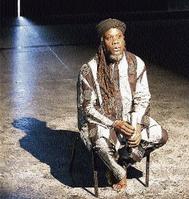Mel Cooke and Krista Henry, Sunday Gleaner Writers
Mutabaruka in the film 'Sankofa'. - Andrew Smith/Photography Editor
When Nobel laureate Derek Walcott pointed out the natural relationship between film and poetry at the 2008 Calabash International Literary Festival, not many present would have known how true his words would ring at another festival less than a month later.
However, while Walcott was speaking about the process of the two art forms, at last weekend's Flashpoint Film Festival in Port Royal, Kingston, the poets were on the big screen.
In an onstage interview with Kwame Dawes, Walcott told the large audience at Treasure Beach, St Elizabeth, in late May, that film is closer to poetry than literature. He said "the camera cannot do metaphor, but it can do simile, because it works frame by frame".
And he pointed out that "the compression in film is the same as editing for a poem".
In that sense, the filmmaker and the poet would be artistic soul mates, but on successive nights at Flashpoint, the poets were not behind the lens as directors, but in front as actors.
star poets
Everaldo Creary of the No-Maddzz poetry group, is one of the stars of the teenage comedy, Candy Shop, which follows three young men just past high school on an escapade that involves exotic dancers, marijuana cake and sexual confusion. The night after Candy Shop debuted, Creary was again on the big screen, this time along with his No-Maddzz colleague, Sheldon Shepherd.
Shepherd is the star of Better Mus' Come, an action drama about the events leading up to the January 1978 Green Bay Killings in St Catherine, where men from the Jamaica Labour Party stronghold of Southside, Kingston, were killed on the army firing range. He appears as 'Ricky', while Creary is fellow Skulls gang member 'Shortman'.
In addition, Sage, a member of the poetry trio, LSX, also plays a prominent role in Better Mus' Come.
While these poets-turned-actors are new to the movie business, on Flashpoint's closing night, Sankofa was slated to be shown; poet Mutabaruka starred in that 1993 film as 'Shango'.
The connection between poets and acting does not, naturally, appear at the movie stage. In fact, it is much more common on the stage itself. The Honourable Louise Bennett-Coverley, renown for her poetry, which includes the Jamaica Labrish collection, was a staple of the Little Theatre Movement's annual National Pantomime.
dub poetry movement
And the dub poetry movement had its most productive and prolific period in the Jamaica School of Drama in the 1970s, with Mikey Smith, Mutabaruka, Oku Onura and Jean 'Binta' Breeze all fusing acting and verse.
Poets in Unity, a group which included Tomlin Ellis, Tommy Ricketts and Malachi Smith, came out of another period at the Edna Manley College of the Visual and Performing Arts.
There are occasions when the poet infuses the performance heavily with drama, as happened in March 2004, when Lloyd Reckord presented Adios Carenage at the Edna Manley College.
poetic standards
At the time, The Gleaner said, "From screen and stage, with words and body language, Lloyd Reckord fused poetry and drama at the Edna Manley College of the Visual and Performing Arts on Sunday night. Those who turned out to the Studio Theatre at the Arthur Wint Drive, St Andrew, college were treated to a well-delivered selection of poetic standards including Derek Walcott's Adios Carenage, which did double duty as the production's title."
Poetry has also been used as the text for larger productions, Fabian Thomas directing Word Medicine earlier this year.
The link between drama and dub poetry is clearly encouraged by the annual Jamaica Cultural Development Commission (JCDC) competitions. According to www.jcdc.org.jm, "more than 2,000 individuals and groups, ranging from the amateur to the professional, enter the JCDC's speech and drama competitions each year. The JCDC's programme in elocution aims at personal development through the appreciation and understanding of good speech as the essence of effective communications".

